Elon’s Spirit and Pride Initiative Affirms Queer and Spiritual Identities
August 13, 2021
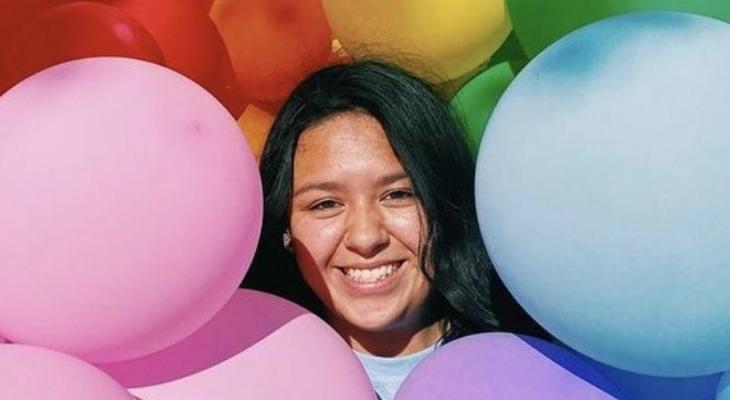
Spirit and Pride is a multifaith program at Elon University that supports the spiritual lives of LGBTQIA+ students. It is advised by Luis Garay (Director of the Gender and LGBTQIA Center), the Rev. Dr. Joel Harter (Associate University Chaplain), and the Rev. Julie Tonnesen (LEAF Campus Minister and Spirit and Pride Coordinator).
When we launched Spirit and Pride in Fall 2019, our first cohort of Spirit and Pride student interns talked excitedly in their interviews about creating a community where students could be both queer and spiritual (whether religious or non-religious). They wanted to create safer and braver spaces for LGBTQIA+ communities to share religious trauma, and they wanted to create spaces of affirmation and celebration to reimagine and integrate queer identities and spiritual identities.
Spirit and Pride is cosponsored by the Gender and LGBTQIA Center (GLC) and the Truitt Center for Religious and Spiritual Life at Elon University. The idea for the program emerged as the Truitt Center encountered more and more students needing and requesting resources, programs, and conversation spaces that engaged the intersections of faith, spirituality, gender, and sexuality. More students and student leaders in Hillel, Catholic Campus Ministry, LEAF (Lutherans, Episcopalians, and friends), and Ukirk Presbyterian Fellowship openly identified with LGBTQIA+ communities, and we knew many others who were not out or who were questioning.
It became clear that the Truitt Center and the GLC needed to develop more intentional collaboration to support students. In higher education especially, queer spaces and religious spaces tend to be completely separate, with students often reporting that they hide or suppress their religious or spiritual identities in queer spaces and suppress their queer identities in religious and spiritual spaces. We discovered many students only connected with the GLC or with the Truitt Center because they did not feel fully welcome in the other space.
Share
Related Articles
American Civic Life
American Civic Life
The Interfaith Legacy of Muhammad Ali: “The Wise Man Changes”
American Civic Life
Is This a Time for Bridgebuilding? 5 Leaders in Conversation
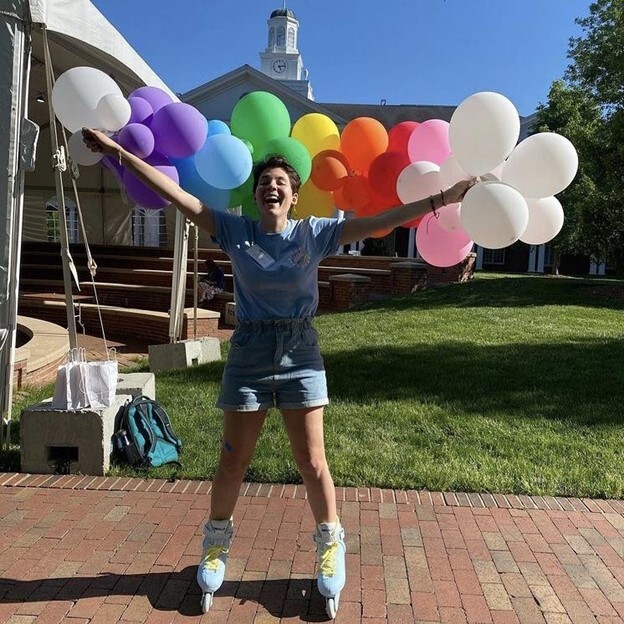
Spirit and Pride Intern Lily Kays
Our early plans for Spirit and Pride identified three primary objectives: first, offer support and healing for students who have experienced religious trauma; second, create opportunities for religious students and communities to hear LGBTQIA+ stories and to become more aware of how they contribute to religious hurt; and third, provide training and resource guides for campus religious groups to become more inclusive and affirming.
Admittedly, the pandemic interfered with our plans, delaying our speaker series and limiting the events we could offer. However, it also created new opportunities with social media and technology. Intern Hayley Loftus coordinated Instagram campaigns to educate about religious trauma and feature queer spiritual leaders for Black History Month and Hispanic Heritage Month. Interns Lily Kays and Anna Ditesheim launched the Queer and Divine podcast.
As these initiatives make clear, interns are at the heart of Spirit and Pride, driving our programs and helping advisors identify community-specific needs. Reflecting on her Spirit and Pride experience, intern Hayley Loftus noted, “What excites me most about Spirit and Pride is the opportunity to create space for acceptance between queer and religious communities that few universities have. I am looking forward to continuing to build this bridge and foster an environment on Elon’s campus that uplifts intersectionality and all identities.”
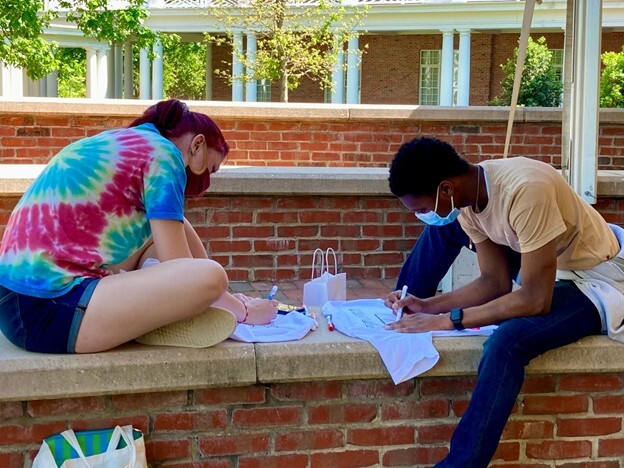
Students coloring pride shirts at a Spirit and Pride event
Interns have also been pivotal in casting a vision for our work. When we launched Spirit and Pride, we (program advisors) were framing LGBTQIA+ student spirituality primarily in terms of hurt, often assuming an either/or separation. While building bridges and addressing religious trauma are important, our student interns have challenged us to imagine new possibilities for the integration and celebration of queer and spiritual identities. This includes not assuming that religious LGBTQIA+ students feel a need to reconcile their queer and religious identities (Blair Imani has a great TED talk on being queer and Muslim), and also affirming, supporting, and celebrating the myriad ways students reimagine religious traditions and create their own authentic spirituality, often in ways that resist traditional labels and definitions.
Kays and Ditesheim’s podcast is one way the integration of queer and spiritual identities has been creatively explored. The celebratory title Queer and Divine was chosen to represent the spirit and courage of LGBTQIA+ communities and to affirm all the ways queer folks create meaning, connection, and community. For some, this meaning-making is religious, for others it is not, and for many it’s undefined, but everyone’s story is meaningful and sacred. Importantly, the podcast creates space to reimagine both what it means to be queer and what it means to be spiritual or divine. Kays shared, “I’ve been so incredibly lucky to have support to start a podcast called Queer and Divine that gives a platform for queer religious and spiritual folks to tell their stories for others to hear and to learn from.”
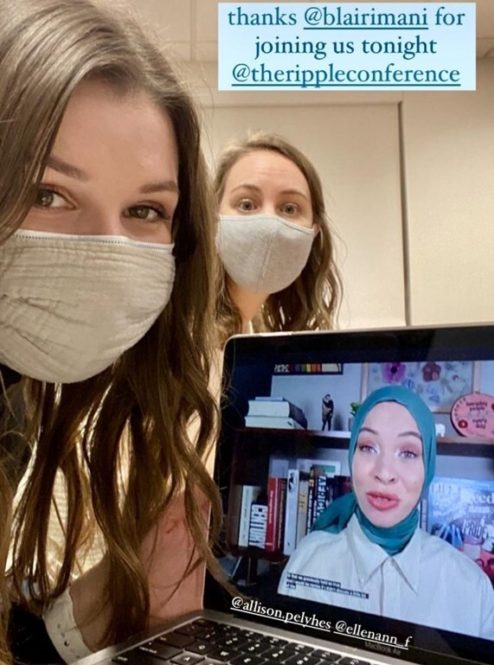
Ripple Director and Interfaith Intern Caroline Penfield and Multifaith Coordinator Allison Pelyhes at Ripple 2021 with Blair Imani
Spirit and Pride is also intentionally multifaith and intentionally interfaith. Our interns thus far have included students who identify as Buddhist, Catholic, Jewish, Protestant, spiritual, and nonreligious, and our annual speaker series prioritizes the inclusion of religious and spiritual leaders from diverse traditions. Last year, this series included Blair Imani—a writer, mental health advocate, and historian living at the intersection of Black, Queer, and Muslim identities—who keynoted Elon’s Ripple Interfaith Conference. At the same conference, Spirit and Pride interns facilitated a sharing circle for LGBTQIA+ students and allies—one of many ways we have created space for storytelling across queer, religious, and spiritual identities.
Going forward, we are developing trainings and resources that will provide opportunities for students, faculty, and staff to learn about the intersections of faith, spirituality, gender, and sexuality. Ultimately, we hope these efforts will help members of our community recognize opportunities for diversity and inclusion within different faith traditions and appreciate all the ways (religious and nonreligious) that students can be both queer and spiritual.
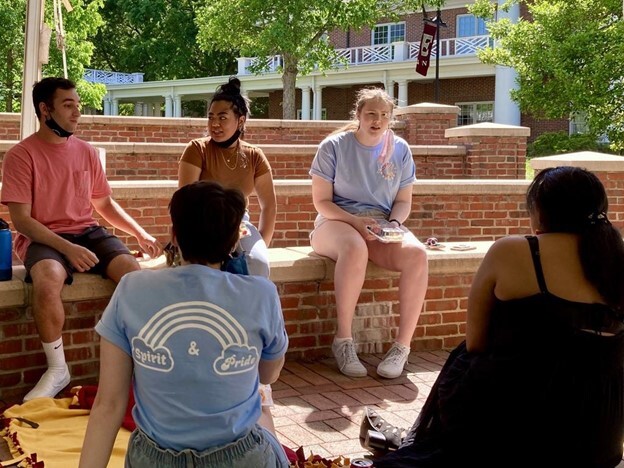
Students sharing at a Spirit and Pride event



